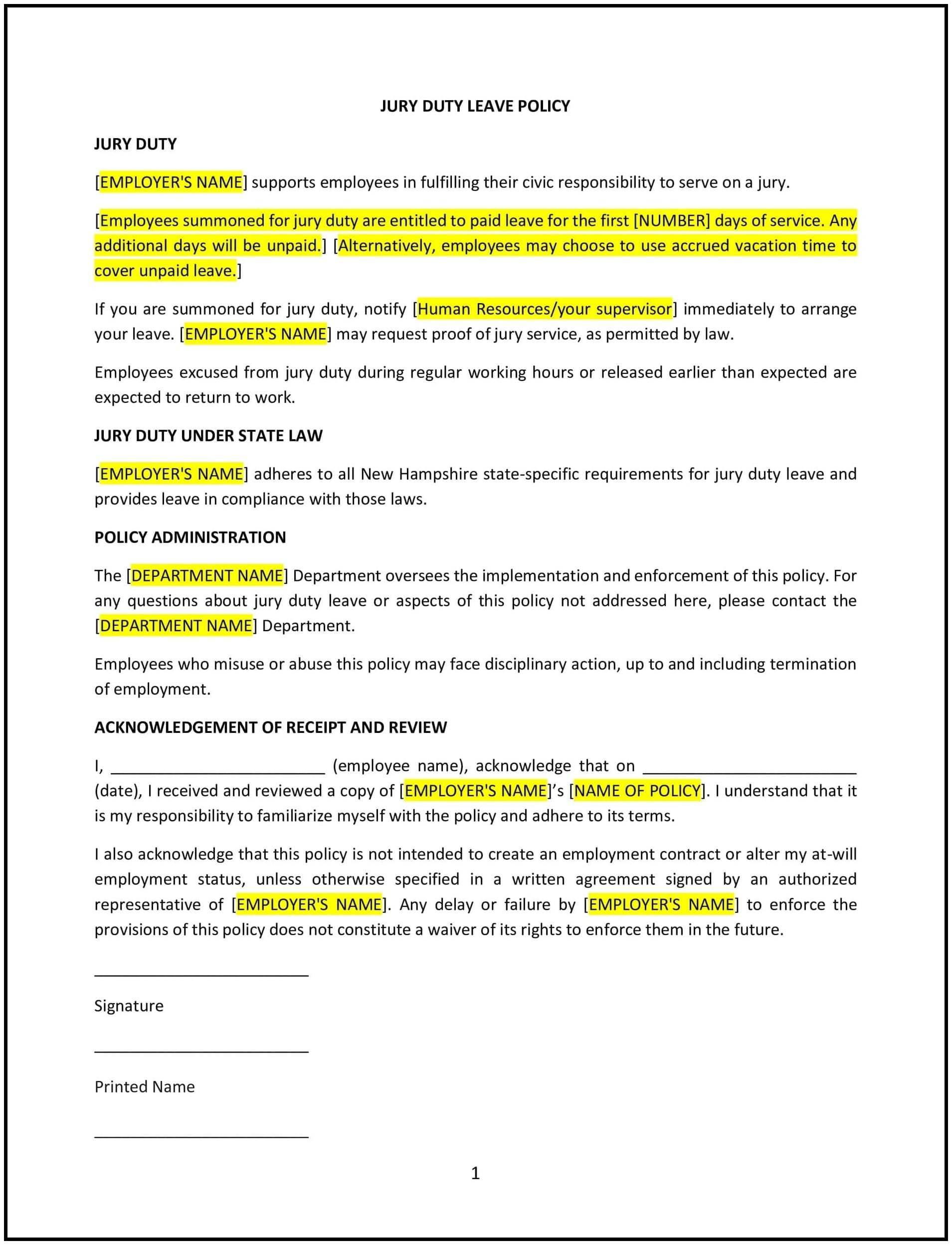Jury duty leave policy (New Hampshire): Free template
Got contracts to review? While you're here for policies, let Cobrief make contract review effortless—start your free review now.

Customize this template for free
Jury duty leave policy (New Hampshire)
A jury duty leave policy helps New Hampshire businesses manage employee absences due to jury service. This policy outlines the company's commitment to providing employees with time off for jury duty while ensuring the continuity of business operations. The policy also covers pay arrangements, documentation requirements, and employee responsibilities during the leave period.
By implementing this policy, businesses can support employees' civic duties, support compliance with state laws, and ensure that employees feel respected and valued during their time away from work.
How to use this jury duty leave policy (New Hampshire)
- Define eligibility: Specify which employees are eligible for jury duty leave, including full-time, part-time, and temporary employees, and outline the length of leave available.
- Outline the documentation process: Require employees to provide proof of jury service, such as a summons or other official documentation, to qualify for leave.
- Address pay during leave: Clearly state whether employees will be paid during jury duty leave, and if so, under what conditions. Businesses may choose to pay the full amount, a portion of the employee's wages, or offer unpaid leave.
- Specify the duration of leave: Define the maximum duration of leave for jury duty, including how long employees are expected to remain on leave and when they should return to work.
- Clarify responsibilities: Explain the responsibilities of employees during jury duty leave, including notifying their employer of their absence, updating the company on their status, and returning to work once the service is complete.
- Discuss workplace accommodations: If necessary, offer accommodations to employees returning from jury duty, including flexibility with their schedule if they are fatigued or if they require time to transition back into their normal duties.
- Review and update: Regularly review and update the policy to ensure it reflects changes in New Hampshire state laws or company practices regarding jury duty leave.
Benefits of using this jury duty leave policy (New Hampshire)
This policy provides several benefits for New Hampshire businesses:
- Supports employees' civic duties: A jury duty leave policy demonstrates the company's commitment to supporting employees' civic responsibilities, helping them serve without the worry of losing income or facing repercussions.
- Enhances employee satisfaction: By providing paid or protected leave for jury service, businesses can foster goodwill and improve employee morale.
- Complies with state regulations: The policy helps businesses comply with New Hampshire's laws regarding jury duty leave, ensuring they meet legal requirements while protecting employee rights.
- Reduces disruptions: With clear guidelines for handling jury duty absences, businesses can plan ahead and reduce the impact of employee absence on daily operations.
- Promotes fairness and consistency: A well-defined policy ensures that all employees are treated equitably when it comes to jury duty leave, maintaining consistency in how the business handles such requests.
Tips for using this jury duty leave policy (New Hampshire)
- Communicate the policy clearly: Ensure all employees are aware of the company's jury duty leave policy, including the process for requesting leave and the documentation required.
- Plan ahead for employee absences: When possible, plan for potential absences by cross-training employees and ensuring there is a backup for critical tasks during jury duty leave.
- Maintain confidentiality: Treat employee jury duty information confidentially and only share details with those who need to know within the company.
- Be flexible with returning employees: If an employee feels fatigued after completing jury service, provide accommodations such as flexible hours or a light workload to help them transition back into their role.
- Stay informed about changes in state law: Periodically review New Hampshire's jury duty leave laws to ensure the policy remains compliant and up-to-date with any legal changes.